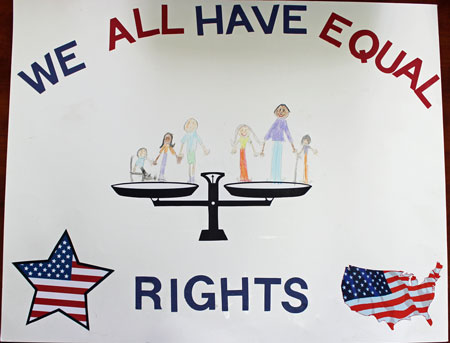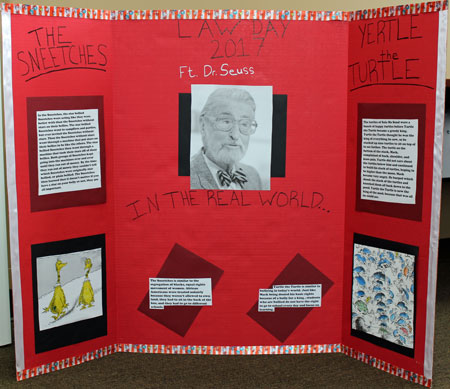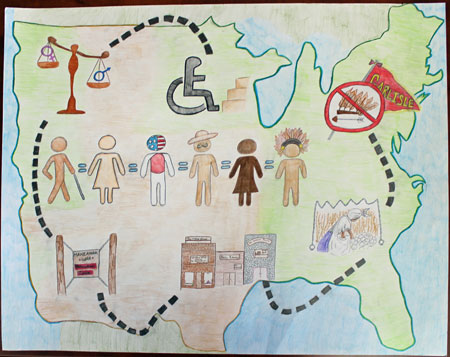Law Day 2017 Art & Essay Contest Winning Entries
The Importance of Equality
Everyone in this country should be treated fairly and equally. Once at school I saw a girl who was being teased by three older kids about the way she was dressed. I was so heartbroken. I imagined how I would feel if that was me right then. I ran and got a teacher. Soon enough the problem was solved. In my school we have a rule that nobody should be bullied. We have this rule that way nobody feels left out. If somebody has different colored skin, or was born in a different place than you, or doesn't have lots of money or is different in any other way that doesn't mean anything is wrong with them. I am very glad our school has this rule because it keeps everyone happy and content.
I am also very glad that our country has laws like this too. There are so many different people in this nation and even though everyone is different in some ways we are all the same on our inside! Having laws is a great way to have everyone get along!
Lindsay Garber
Lyter Elementary School
Alice Ravert
Lyter Elementary School
Equal Protection Of Voting Rights
I believe that requiring a voter's ID is unfair. The 14th Amendment says that a state may not deny any person the equal protection of the laws, but some states are creating voter ID laws that take people's rights away.
Where I live voters can register online. I've gone with my parents to vote and it was quick and easy. The polling place was two blocks away, the line was short, and it only took ten minutes. But I have read about people who don't get to vote that easily.
David Rector, a California man with disabilities, lost his voting rights due to a brain injury even though he was able to tell a judge, "I, David Rector, want my voting rights restored immediately," through his eye-tracking device.
Other people are fighting for their rights, too. In 2016 a judge said that North Dakota's voter ID law was unfair because native Americans without a residential address, who instead used a post office box to get their mail, couldn't register to vote.
Equal protection means that registering and voting should be as easy for everyone as it is for my family- but it isn't. Some people may not be able to travel to the registration office to get an ID. Some people can't afford an ID. Even though some states offer a free ID, you still might have to pay for a copy of a birth certificate. This means if someone can't pay the fee, they can't vote.
Everyone should have a say in choosing the president. Just because someone may have challenges does not mean that they should be denied the right to vote. That is why the 14th Amendment, providing equal protection under the law, is important to transforming American democracy.
Sophia Carithers
Central Elementary School
The Fourteenth Amendment: Transforming American Democracy
"No man shall be arrested or imprisoned ... except by the lawful judgement of his peers or by the law of the land."
- Magna Carta, Clause 39
Thomas Jefferson and The Second Continental Congress wrote The Declaration of Independence. In this document, they stated, "We hold these truths to be self-evident, that all men are created equal, that they are endowed by their creator with certain unalienable Rights, that among these are Life, Liberty and the pursuit of Happiness". This statement has great importance because these two elements (that "all men are created equal" and that we have the right to "life, liberty and the pursuit of happiness") is the foundation of a free and democratic country. From these concepts came the United States of America.
While the Declaration of Independence states that all men are created equal, our laws meant that only free, property owning males were created equal. Our laws made distinctions between freemen vs. slaves, men vs. women, property owners vs. debtors, etc. (Thomas E. Patterson, The American Democracy).
Eighty-five years after the Declaration of Independence, the American Civil War began for the main reason of freeing the slaves. Four years later, the Union won the war, and the slaves were free.
To ensure that African Americans/former slaves had equal protection and citizenship rights, the Fourteenth Amendment to the Constitution was adopted on July 9, 1868. Up until this point, slaves and their descendants were not considered citizens and the laws didn't apply to them.
The Fourteenth Amendment has five sections. Section one has four clauses: The Citizenship Clause, The Privileges Clause, The Due Process Clause, and The Equal Protection Clause. The Due Process Clause prohibits state and local government officials from depriving persons of life, liberty or property without legal authorization. This means that the government can't execute someone, put them in jail, or take away their opportunity to succeed without respecting all legal rights that are owed. The government also can't make unreasonable, arbitrary or capricious decisions. This means a decision not based on reason.
Due process is what ensures that our country is free. Without it, the government could throw people in jail based only on the government's opinions or execute people without giving the accused a chance to be heard. Citizens should have the right to defend themselves against the government before our freedom is taken away.
I believe due process is important because it ensures that all citizens of the United States can have life, liberty, and the pursuit of happiness, and this freedom can't be taken away by the government without a decision based on reason.
While the Declaration of Independence, the Constitution and the Fourteenth Amendment were great advances at giving people rights, it still didn't mean that everyone was treated equally or fairly. Our country is still working towards ensuring equality and due process for all citizens.
Emma E. Strickland
Loyalsock Middle School
I was around the age of eleven when I read through some old news articles that had been released a few months earlier. The title "14 Year Old George Stinney Legally Exonerated" flashed before my eyes. That probably would have sounded like a perfectly happy ending to anyone who didn't know the George Stinney case. When he was fourteen, he had been arrested for the murder of two girls, which was a crime that he actually didn't commit. But, even though he was exonerated, George wouldn't be released from prison so he could go home to his family.
The teenager was executed in 1944.
I was around the age of eleven when I cried over a body that I hadn't seen, over a person whom I'd never met, over a matter that took place before I was born. Ever since I had first read about him, I had always felt sorry for the black teenager who was the victim of injustice just because of being in the wrong place at the wrong time and being the wrong color. Since his story brought tears to my eyes, I didn't want to think about George. I didn't want to feel emotion towards a decades-old case when I could easily walk away. But I kept reading. I knew better than to run from the truth.
I was around the age of eleven when I became obsessed with learning everything I could about a teenager who died years ago just so I could get the story straight. George was bribed with ice cream in order to make him confess, He was given a lawyer who didn't want to do pro-bono work. Every single jury member was white because blacks weren't allowed in that courtroom as jury members. George was sentenced to the electric chair after just ten minutes of deliberation. All of this happened because his life wasn't protected and he didn't have a chance to make his voice heard. If only there had been a rule in place at the time that would protect him. Actually, there was. It was called the Fourteenth Amendment.
I was around the age of thirteen when my teacher asked me to enter a writing competition. Once I read the guidelines, I knew that I had to be a part of it, because I had strong opinions that needed to be heard. I'm happy that the Fourteenth Amendment exists, but it wasn't there for George and it wasn't there for countless others who needed their homes, families, and lives protected. I'm sorry, but I'm not going to stand here and praise the Fourteenth Amendment and discuss how it saved so many lives, because there are so many lives that it didn't save, In spite of this, I still encourage the Fourteenth Amendment, and I hope that it will be there for everyone who will need this protection in the future. Everyone, no matter their race, religion, gender, age, or sexuality deserves protection from injustice.
Who knows? It may be too late for George, but it might not be too late for someone else who is in prison for a crime that he or she did not commit. If the Fourteenth Amendment and other American rights protect that person, then we won't have to lose another life to the hands of corruption.
We have a chance to learn from every wrongdoing, and I hope we learn from the fate of George Stinney.
Lanie Mussina
McCall Middle School
The Fourteenth Amendment has had many successes as well as disagreements among the people since its adoption on July 9, 1868. The Fourteenth Amendment was primarily intended to establish equal civil rights for former slaves. In this amendment, there are three provisions: The Citizenship Clause, The Due Process Clause and the Equal Protection Clause. The Citizenship Clause granted citizenship to all persons born and naturalized in the United States. The Due Process Clause declared that states may not deny any person "life, liberty, or property, without due process of law." Lastly, the Equal Protection Clause said that a state may not deny to any person within its jurisdiction the equal protection of the law. Prior to its enactment, the individual protections offered by the Bill of Rights were only enforced against the federal government. The Fourteenth Amendment then applied these rights to the states.
There are also five sections to this amendment. Section one discusses that everyone born or naturalized in the United States cannot be deprived of life, liberty and property without due process of the laws. Section two states that no law may be made that may abridge privileges or immunities of the citizens. Section three states that nobody can become a leader in government if they have rebelled or helped the enemy. However, Congress can change this disability by a two-thirds vote. Section four says that The United States will pay all of its debts that were authorized by law. However, the US, and none of the individual states, will pay any debt that was used for fighting in a rebellion against the US. Section five then states that Congress shall have all the power to enforce the provisions that have been mentioned in this amendment. This amendment is cited in more court cases than any other amendment. Most cases throughout history have dealt with discrimination based on race, religions, gender and sexual orientation.
For example, a success of this amendment was the Brown vs. Board of Education case in 1954. This case was mainly about the separation of blacks and whites in schools, jobs and even out on the streets. This case ended with a realization that it was a violation of the Equal Protection Clause of the Fourteenth Amendment and was a victory for the Civil Rights Movement. Even though this case made it so black and white students got the same education and were officially treated as equals, there are still people in this world that see differently.
As of today, there is the Black Lives Matter and the Blue Lives Matter Movements. These movements were established due to the inequality African Americans have faced when it comes to the police and the law, and the assumption that all police officers are "bad". There have been many times social media and even news stations has shown videos of cops that are assaulted by African Americans, and even innocent African Americans who are treated like dirt by police and others. The Baltimore protests of 2015 is a prime example of how out of control this problem is. Another example is the shooting and protests in Ferguson, Missouri. These protests and the assumptions made by cops has shown that this just is not right for the world or for the growth of equality like the Fourteenth Amendment states.
Another successful event that has proved that the Fourteenth Amendment has improved the growth of America is the Obergefell vs. Hodges case of 2015. This case was about the inequality and disagreements against same-sex marriage. This case also showed a violation against the Equal Protection Clause and the Due Process Clause. As of June 26, 2015, this case made same-sex marriage in the states legal for everyone; this lead to the movement called "Love ins." Even though the legalization of same-sex marriage is still not fully accepted by everyone, it showed a huge step in American equalization.
The last example of how this amendment needs improved is with the deportation that President Donald Trump keeps addressing. Section one of the amendment shows how this plan cannot happen without due process of the law. This means that you cannot deport or make decisions that will affect a person's right to their life, liberty and property without an actual court agreement as to why this person is violating the privileges. Illegal immigrants are violating the first section of the amendment, but only partially. Even though they are illegal immigrants, the courts should check into their background and see how long they have been living in the United States and if they have had any criminal or threatening aspects towards other citizens before deporting them. This is because most of the immigrants are in the states for a better life and a new start from their troubled homeland. In 1882, the United States passed the Chinese Exclusion Act. This act stayed for ten years and stated that the United States would not allow anymore Chinese to live here. Unless, they were teachers, students or merchants. This also happened during World War II; Germans and the Japanese in the C.S. were put in camps to be controlled. Even though terrorists attacks have been more common to the world in just the past year, we cannot just make assumptions about everyone based on their race or where they originally came from. Everyone has privileges and rights that simply cannot be taken away or taken advantage of.
The Fourteenth Amendment unbalances within the states proves that the United States cannot be a ''perfect society" as the law may want. Not everyone is going to agree or think that having something legalized is the best option, however, putting other citizens at risk and making assumptions instead of just agreeing to disagreeing is putting this country in a steady decline instead of a steady growth in equalization. As Robert Bork once said, "The purpose that brought the Fourteenth Amendment into being was equality before the law, and equality, not separation, was written into the law."
Faith Leathers
Jersey Shore Area Senior High School

Reagan Tucker
Lyter Elementary School

Rain Snyder
Lyter Elementary School

Julia Mertes
Montoursville High School

